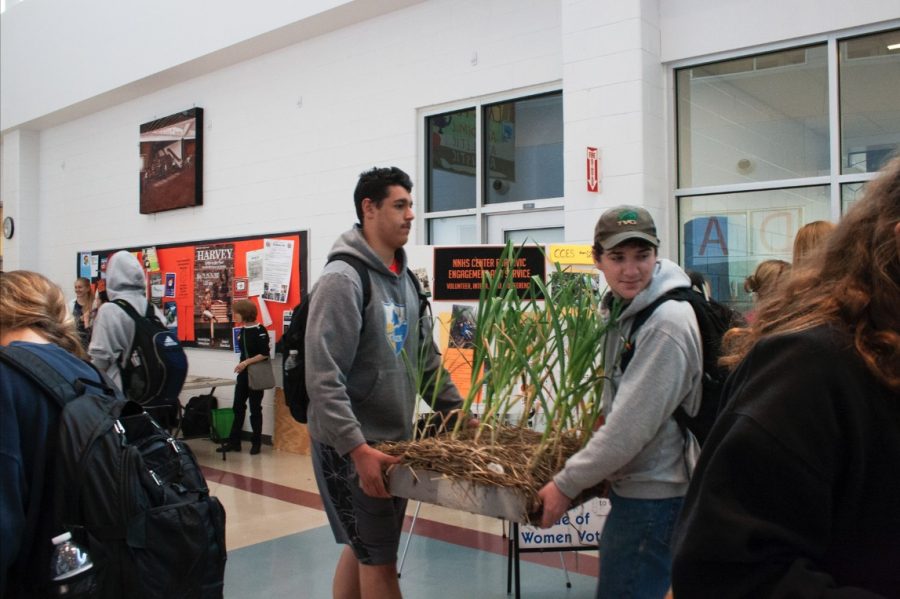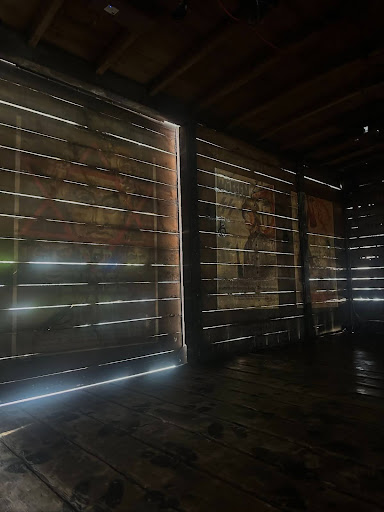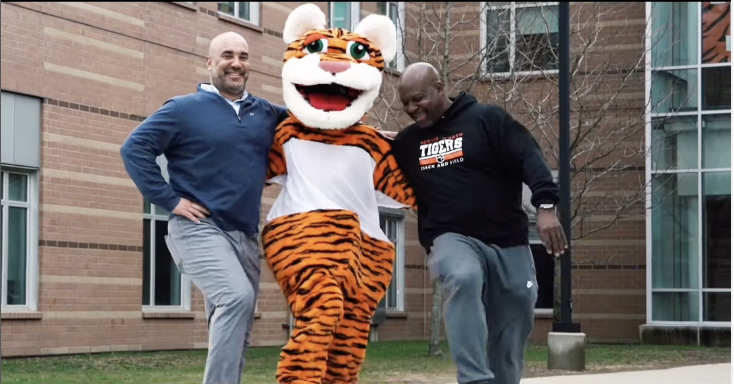B-block
by Amy Morrill
Members of agriculture club and Alison Scorer, who works at Newton Community Farm, presented about sustainable agriculture as part of Enviro Day May 23 during B-block in the Little Theatre.
The block began with seniors Colin Kadis, Nathaniel Klein, and Ryan Steele presenting about Newton’s agricultural history, as well as the agriculture club’s successes and failures.
Kadis explained that Newton used to be mostly made up of farms, saying, “We have a significant agricultural past in Newton.” He added that this past is evident in the stone walls and ancient, big trees that can be seen throughout the city.
According to Kadis, although “Newton was one of the top agriculture centers in Massachusetts,” trains were built to allow easy access to Boston, making “farms turn into houses. It was kind of a disappointment,” he said.
Klein then described the benefits of the joining agriculture club. “I had a lot of fun, made a lot friends, and learned a lot about planting and gardening. I’d never gardened before,” he said.
The club cultivates a hanging garden on the side of the school, which has a variety of difficulties, according to Kadis, including failed irrigation, plants growing into each other, and dirt falling out of the garden.
He added that another problem is needing to put in a lot of time to have consistent crops because of growing patterns. “If you want to have kale for people every week, you need to plant kale every week,” he said. “Time management is the biggest struggle in sustainable agriculture.”
The agriculture club finished their presentation by showing the audience pictures of unconventional ways to garden other than a hanging garden, which included planting in soda bottles, on roof tops, or in raised beds. Kadis concluded, “there are few excuses” not to garden given all of the options available.
Next, Scorer spoke about Newton Community Farm, the only working farm currently run in Newton. Although the city owns the land, the nonprofit farm manages it on behalf of the city, saving it from becoming condos or something similar.
Scorer described sustainable agriculture as when “practices people are using are in-line with the environment, not against it.” An example of this is following the seasons when planting.
She also explained that creating a “closed system,” such as feeding weeds to chickens, whose poop can be used as fertilizer for fields, greatly benefits the environment.
Contrary to the simple definition of helping the environment, Scorer also said that sustainable agriculture means using practices to support the community. Consequently, Newton Community Farm provides food to farmers market and has a system for people to regularly pick up vegetables from their farms, as well as providing to food pantries.
“It’s about access for everyone to fresh, locally grown food,” said Scorer.
The block ended with Kadis, Klein, and Steele leading the audience in a rap about agriculture, with lyrics such as “worms mess with forest soils” and “worms be acting cruel.”
Steele asserted, “This may be the worst thing you’ll ever see,” but Kadis added, “it will teach you.”
C-block
by Tali Falk-Judson
Panelists discussed environmental journalism in the Little Theater during c-block as part of Enviro Day.
The three panelists, Roger Archibald, photo editor for the Society for Environmental Journalism, Carolyn Bealer, a reporter for National Public Radio, and Freelance science journalist Dan Grossman, spoke about life as an environmental journalist and answered questions from the attending audience.
“In a lot of ways, environmental journalism, at least in print, is a dying medium. We do most of our work through freelancers,” said Archibald.
Freelance science journalist Dan Grossman spoke about the importance of factual reporting.
“Our most important job is to make sure everyone knows the unbiased truth, regardless of whether or not they want to hear it,” said Grossman.
Bealer said, “Nowadays, information is readily available for everyone, and a lot of people don’t see a reason for so much effort to be put into covering the environment, but it’s very important, especially with the sorts of issues surrounding us today.”
D-block
by Rose Bostwick
North students discussed a variety of personal experiences and projects surrounding environmental activism May 23 during D-block in the Little Theatre.
To open the presentation, senior Jenny Horsburgh spoke about her involvement with several environmental activist groups outside of school, including the Newton chapter of 350.org. Though Horsburgh said that the environmental protection community is often dominated by older adults, she added, “It is our place if we make it.”
“Environmental crises have way more problems than we can possibly solve by doing the baseline, recommended things,” she said, citing a need for immediate action and involvement from adults and students alike.
Following Horsburgh were seniors Anna Bosco and Isabel Joyce, who presented about their year-long biology project that cumilated in their creation of the Instagram account @simple.sustainability.
“A lot of people think climate change is a very liberal, very partisan issue, but it’s not,” Bosco said. “Everyone can be involved.”
Joyce addressed those who do not consider environmental issues of consequence, saying that there are “a lot of reasons to care, like a loss of biodiversity, rising global temperatures, and a loss of ecosystems.”
Next, juniors Spencer Bowman and Jack Vasu, greengineering students, showed and explained their year-long project using aquaponics, a “sustainable system that uses 90 percent less water than traditional agriculture and can be used all year round,” according to Bowman.
The block concluded with a demonstration from seniors Mukand Desibhatla and Tharun Kannan, which detailed their method of making soap using environmentally conscious materials to propose a solution to the overuse of palm oil, the mining of which causes severe destruction to habitats in many different regions
“It is not a question of environmental issues being the only thing that matters,” Horsburgh said. “It is a question of environmental issues affecting every single thing that matters to us.”
F-block
by Maya Waldman
Panelists discussed various ways in which adolescents can get involved in environmental action in Newton as a part of Enviro Day, Tuesday, May 23, during F-Block in the Little Theatre.
The panel consisted of Newton Solid Waste and Recycling Manager, Waneta Trabert, Newton Co-director of Sustainability, Ann Berwick, President of Green Newton, Marcia Cooper, and Newton Chair of Solid Waste Commission, Marian Rambelle. Their discussion was focused on how Newton families can use, conserve, and create energy in ways that are better for the planet.
“Most people want to do the right thing when it comes to saving the environment,” said Trabert. “The problem is that they don’t always know what the right thing is.”
The right thing, according to Cooper, is to take one thing at a time.
She advised the audience to choose one thing in their daily routine and to turn it green. “Instead of drinking out of a single-use plastic water bottle, drink from a reusable one,” said Cooper.
The panel also touched on municipal aggregation, the process by which a city purchases electricity in bulk from suppliers on behalf of the residents and businesses within the community.
Municipal aggregation then allows for the community to save more money and spend it on renewable sources of energy, such as solar panels or wind turbines.
Another legal action that was implemented recently according to the panelists was the ban on plastic bags in supermarkets that are over 300 square feet.
“We still have a long way to go,” said Berwick on the plastic bag ban. “But it’s a start.”
The panelists also discussed the idea of reusing, reducing, and recycling, the three “most fundamental actions that you can take in saving our earth,” according to Rambelle.
Throughout the presentation, the panelists encouraged the audience to take action.
“Instead of worrying about it, do it,” said Cooper. “You have the ability.”















































